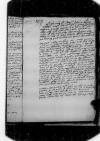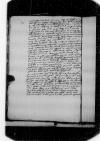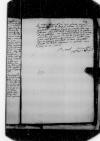Magnifice Domine tamquam frater carissime.
Salutem et felicitatem.
cf. Ioannes DANTISCUS to Antonio Niccolo CARMIGNANO (Suavius PARTHENOPEUS) Granada, 1526-08-12, CIDTC IDL 299⌊Rescripsicf. Ioannes DANTISCUS to Antonio Niccolo CARMIGNANO (Suavius PARTHENOPEUS) Granada, 1526-08-12, CIDTC IDL 299⌋ copiose cf. Antonio Niccolo CARMIGNANO (Suavius PARTHENOPEUS) to Ioannes DANTISCUS Bari, 1526-03-12, CIDTC IDL 6560, letter lost⌊litteriscf. Antonio Niccolo CARMIGNANO (Suavius PARTHENOPEUS) to Ioannes DANTISCUS Bari, 1526-03-12, CIDTC IDL 6560, letter lost⌋ Dominationis Vestrae 21(!) Martii Bari, castle and city in southern Italy, capital of Duchy of Bari⌊BariiBari, castle and city in southern Italy, capital of Duchy of Bari⌋ datis, duodecima Augusti praeteriti. Ab eo tempore a Dominatione Vestra nullas accepi, unde quod illi interea rescriberem, non habui. Ad praesens tamen mihi temperare non potui, quin saltem Dominationem Vestram ad solitum scribendi officium revocarem, quo utrimque, quid in rebus nostris agatur, scire possemus.
Misi 1526-10-06⌊sexta Octobris novissimi1526-10-06⌋ litteras cambii 300 duc(atorum), quos Granada (Granata), city in southern Spain, Andalusia, at the foot of the Sierra Nevada mountains⌊hicGranada (Granata), city in southern Spain, Andalusia, at the foot of the Sierra Nevada mountains⌋ a The Welsers merchant and banking family from Augsburg with close ties to Emperor Charles V⌊WelzerisThe Welsers merchant and banking family from Augsburg with close ties to Emperor Charles V⌋ accepi, quibus prope finem Decembris futuri me sustinebo, ab istis 300, quos 1526-08-12⌊12 Augusti1526-08-12⌋ accepi, nuntium proprium ad Bona Sforza (*1494 – †1557), Queen of Poland and Grand Duchess of Lithuania (1518-1557); the second wife of Sigismund I Jagiellon; Duchess of Bari and Rossano; daughter of Gian Galeazzo Sforza of Milan and Isabella of Aragon⌊reginalem maiestatemBona Sforza (*1494 – †1557), Queen of Poland and Grand Duchess of Lithuania (1518-1557); the second wife of Sigismund I Jagiellon; Duchess of Bari and Rossano; daughter of Gian Galeazzo Sforza of Milan and Isabella of Aragon⌋ hic cum provisionibus obtentis expedivi, effecique tantum magna cura et labore, quod tandem reginali maiestati castellanum Bari, castle and city in southern Italy, capital of Duchy of Bari⌊castro BarensiBari, castle and city in southern Italy, capital of Duchy of Bari⌋ praeficere lic superinscribed in place of crossed-out b⌈bcc superinscribed in place of crossed-out b⌉ebit, qui Charles V of Habsburg (*1500 – †1558), ruler of the Burgundian territories (1506-1555), King of Spain as Charles I (1516-1556), King of Naples and Sicily, King of the Romans (1519-1530), Holy Roman Emperor of the German Nation (elected 1519, crowned 1530, abdicated 1556); son of Philip I the Handsome and Joanna the Mad of Castile⌊caesariCharles V of Habsburg (*1500 – †1558), ruler of the Burgundian territories (1506-1555), King of Spain as Charles I (1516-1556), King of Naples and Sicily, King of the Romans (1519-1530), Holy Roman Emperor of the German Nation (elected 1519, crowned 1530, abdicated 1556); son of Philip I the Handsome and Joanna the Mad of Castile⌋ aut viceregi gratus sit, et qui iurare debebit id, quod in remotione sequestri expressum est, et quod castrum hoc in his bellorum turbinibus in manus hostium caesareae maiestatis non perveniat, quemadmodum ex istis provisionibus, quas iam duplicatas ad reginalem maiestatem transmisi, latius cognoscet. Quid in his Π encrypted ⌈ΠΠ encrypted ⌉ faciet cognoscemus experiemur, et cumprimis oro, Dominatio Vestra ad me perscribat. Quod si sic se exhibebit, ut mihi est pollicitus, brevi hinc ex hoc e ms. a(!)
⌈ee ms. a(!)
⌉rgastulo exire licebit, quod summopere <desidero>; sed id citra voluntatem Bona Sforza (*1494 – †1557), Queen of Poland and Grand Duchess of Lithuania (1518-1557); the second wife of Sigismund I Jagiellon; Duchess of Bari and Rossano; daughter of Gian Galeazzo Sforza of Milan and Isabella of Aragon⌊reginalis maiestatisBona Sforza (*1494 – †1557), Queen of Poland and Grand Duchess of Lithuania (1518-1557); the second wife of Sigismund I Jagiellon; Duchess of Bari and Rossano; daughter of Gian Galeazzo Sforza of Milan and Isabella of Aragon⌋, quae mihi novissimis iterum iniunxit, ut opperiar hic, donec me expresse dixerit revocandum, fieri non potest. Ferendum est igitur, cf. Ad Gryneam after 1516-11-05, CIDTC IDP 27⌊quod sors, quod fatum, res Bona Sforza (*1494 – †1557), Queen of Poland and Grand Duchess of Lithuania (1518-1557); the second wife of Sigismund I Jagiellon; Duchess of Bari and Rossano; daughter of Gian Galeazzo Sforza of Milan and Isabella of Aragon⌊dominaeBona Sforza (*1494 – †1557), Queen of Poland and Grand Duchess of Lithuania (1518-1557); the second wife of Sigismund I Jagiellon; Duchess of Bari and Rossano; daughter of Gian Galeazzo Sforza of Milan and Isabella of Aragon⌋que dabuntcf. Ad Gryneam after 1516-11-05, CIDTC IDP 27⌋.
Scripsit mihi paulo ante Bona Sforza (*1494 – †1557), Queen of Poland and Grand Duchess of Lithuania (1518-1557); the second wife of Sigismund I Jagiellon; Duchess of Bari and Rossano; daughter of Gian Galeazzo Sforza of Milan and Isabella of Aragon⌊reginalis maiestasBona Sforza (*1494 – †1557), Queen of Poland and Grand Duchess of Lithuania (1518-1557); the second wife of Sigismund I Jagiellon; Duchess of Bari and Rossano; daughter of Gian Galeazzo Sforza of Milan and Isabella of Aragon⌋ ex Cracow (Kraków, Cracovia), city in southern Poland, Małopolska, on the Vistula river, from 1038 capital of the Kingdom of Poland⌊CracoviaCracow (Kraków, Cracovia), city in southern Poland, Małopolska, on the Vistula river, from 1038 capital of the Kingdom of Poland⌋ 20 Iulii praeteriti, quod illi gratum est plurimum, casum hunc cum Antonello Monopoli (†1526), doctor; leader of the revolt in Rossano Duchy in summer 1525, imprisoned by Lodovico Alifio, died by violence in unexplained circumstances being escorted to Poland; Alifio was suspected to kill him; general auditor of the estate of Isabella d'Aragona⌊AntonelloAntonello Monopoli (†1526), doctor; leader of the revolt in Rossano Duchy in summer 1525, imprisoned by Lodovico Alifio, died by violence in unexplained circumstances being escorted to Poland; Alifio was suspected to kill him; general auditor of the estate of Isabella d'Aragona⌋ rebus suae maiestatis nihil obfuisse. Qui etiam deinceps non poterit obesse, neque res haec tanti hic aestimatur, et forsan adversarii nostri desiderabant. Spero, quod aliquando  BCz, 242, p. 62 post istos turbines, cum Π encrypted ⌈ΠΠ encrypted ⌉ in aliis est satisfactum, portum attingemus. Inter alia etiam Bona Sforza (*1494 – †1557), Queen of Poland and Grand Duchess of Lithuania (1518-1557); the second wife of Sigismund I Jagiellon; Duchess of Bari and Rossano; daughter of Gian Galeazzo Sforza of Milan and Isabella of Aragon⌊maiestas sua reginalisBona Sforza (*1494 – †1557), Queen of Poland and Grand Duchess of Lithuania (1518-1557); the second wife of Sigismund I Jagiellon; Duchess of Bari and Rossano; daughter of Gian Galeazzo Sforza of Milan and Isabella of Aragon⌋ mihi scribit, quod est contentissima, ut illius verbis utar, cambium me habere cum The Welsers merchant and banking family from Augsburg with close ties to Emperor Charles V⌊WelzerisThe Welsers merchant and banking family from Augsburg with close ties to Emperor Charles V⌋, et quod illud semper solvi ms. u(!)
⌈ii ms. u(!)
⌉tur et solvetur per Dominationem Vestram absque omni mora et difficultate, et licet prius decreverit et mihi tot litteris scr superinscribed⌈rr superinscribed⌉ipserit, quod expensas meas ea via et ab illis mercatoribus, quos Gian Giacomo de Dugnano ⌊Ioannes Iacobus DunignanoGian Giacomo de Dugnano ⌋, mercator Venetus, suae maiestatis nomine mihi designaret, acciperem, quia tamen intentionem suam impeditam et viam hanc infectam videret, commisit mihi ut uterer officio et benevolentia dominorum The Welsers merchant and banking family from Augsburg with close ties to Emperor Charles V⌊WelzerorumThe Welsers merchant and banking family from Augsburg with close ties to Emperor Charles V⌋ aut The Fuggers German family of merchants and bankers that dominated European business during the 15th and 16th centuries⌊FuccarorumThe Fuggers German family of merchants and bankers that dominated European business during the 15th and 16th centuries⌋, apud quos mihi videretur commodius, dummodo una via sim securus, quodque illis omni favore suo restituere et rependere mandabit maiestas sua, omni mora et difficultate cessante. Idque ideo in notitiam Dominationis Vestrae deduco, ut cum litterae cambii mei venerint, de mente Bona Sforza (*1494 – †1557), Queen of Poland and Grand Duchess of Lithuania (1518-1557); the second wife of Sigismund I Jagiellon; Duchess of Bari and Rossano; daughter of Gian Galeazzo Sforza of Milan and Isabella of Aragon⌊maiestatis reginalisBona Sforza (*1494 – †1557), Queen of Poland and Grand Duchess of Lithuania (1518-1557); the second wife of Sigismund I Jagiellon; Duchess of Bari and Rossano; daughter of Gian Galeazzo Sforza of Milan and Isabella of Aragon⌋ eo modo sit edocta, quam etiam reor in his ad Dominationem Vestram scripsisse, quo dominis The Welsers merchant and banking family from Augsburg with close ties to Emperor Charles V⌊WelzerisThe Welsers merchant and banking family from Augsburg with close ties to Emperor Charles V⌋, qui in hoc meo servitio reginali maiestati libenter inserviunt et non gravate hoc cambium suscipiunt, solutio sine protractione et molestia rependatur et cum benevolentia persolvatur, quod sic Dominationem Vestram plane facturam confido, tum quia voluntas est maiestatis reginalis, tum etiam, quod id expensae, quas hic facere cogor, exuunt et deposcunt.
BCz, 242, p. 62 post istos turbines, cum Π encrypted ⌈ΠΠ encrypted ⌉ in aliis est satisfactum, portum attingemus. Inter alia etiam Bona Sforza (*1494 – †1557), Queen of Poland and Grand Duchess of Lithuania (1518-1557); the second wife of Sigismund I Jagiellon; Duchess of Bari and Rossano; daughter of Gian Galeazzo Sforza of Milan and Isabella of Aragon⌊maiestas sua reginalisBona Sforza (*1494 – †1557), Queen of Poland and Grand Duchess of Lithuania (1518-1557); the second wife of Sigismund I Jagiellon; Duchess of Bari and Rossano; daughter of Gian Galeazzo Sforza of Milan and Isabella of Aragon⌋ mihi scribit, quod est contentissima, ut illius verbis utar, cambium me habere cum The Welsers merchant and banking family from Augsburg with close ties to Emperor Charles V⌊WelzerisThe Welsers merchant and banking family from Augsburg with close ties to Emperor Charles V⌋, et quod illud semper solvi ms. u(!)
⌈ii ms. u(!)
⌉tur et solvetur per Dominationem Vestram absque omni mora et difficultate, et licet prius decreverit et mihi tot litteris scr superinscribed⌈rr superinscribed⌉ipserit, quod expensas meas ea via et ab illis mercatoribus, quos Gian Giacomo de Dugnano ⌊Ioannes Iacobus DunignanoGian Giacomo de Dugnano ⌋, mercator Venetus, suae maiestatis nomine mihi designaret, acciperem, quia tamen intentionem suam impeditam et viam hanc infectam videret, commisit mihi ut uterer officio et benevolentia dominorum The Welsers merchant and banking family from Augsburg with close ties to Emperor Charles V⌊WelzerorumThe Welsers merchant and banking family from Augsburg with close ties to Emperor Charles V⌋ aut The Fuggers German family of merchants and bankers that dominated European business during the 15th and 16th centuries⌊FuccarorumThe Fuggers German family of merchants and bankers that dominated European business during the 15th and 16th centuries⌋, apud quos mihi videretur commodius, dummodo una via sim securus, quodque illis omni favore suo restituere et rependere mandabit maiestas sua, omni mora et difficultate cessante. Idque ideo in notitiam Dominationis Vestrae deduco, ut cum litterae cambii mei venerint, de mente Bona Sforza (*1494 – †1557), Queen of Poland and Grand Duchess of Lithuania (1518-1557); the second wife of Sigismund I Jagiellon; Duchess of Bari and Rossano; daughter of Gian Galeazzo Sforza of Milan and Isabella of Aragon⌊maiestatis reginalisBona Sforza (*1494 – †1557), Queen of Poland and Grand Duchess of Lithuania (1518-1557); the second wife of Sigismund I Jagiellon; Duchess of Bari and Rossano; daughter of Gian Galeazzo Sforza of Milan and Isabella of Aragon⌋ eo modo sit edocta, quam etiam reor in his ad Dominationem Vestram scripsisse, quo dominis The Welsers merchant and banking family from Augsburg with close ties to Emperor Charles V⌊WelzerisThe Welsers merchant and banking family from Augsburg with close ties to Emperor Charles V⌋, qui in hoc meo servitio reginali maiestati libenter inserviunt et non gravate hoc cambium suscipiunt, solutio sine protractione et molestia rependatur et cum benevolentia persolvatur, quod sic Dominationem Vestram plane facturam confido, tum quia voluntas est maiestatis reginalis, tum etiam, quod id expensae, quas hic facere cogor, exuunt et deposcunt.
Pro domino doctore Sigismundus de Russis (Sigismundus de Rossi, Sigismundus Barensis), lawyer from Bari, doctor of both canon and civil laws; in 1531 he applied for the position of auditor in Calabria or Bari and Otranto district; in 1537 in Naples (POCIECHA 4, p. 232, 252)⌊Sigismundo de RussisSigismundus de Russis (Sigismundus de Rossi, Sigismundus Barensis), lawyer from Bari, doctor of both canon and civil laws; in 1531 he applied for the position of auditor in Calabria or Bari and Otranto district; in 1537 in Naples (POCIECHA 4, p. 232, 252)⌋, fratre ms. fratri(!)
⌈fratrefratre ms. fratri(!)
⌉ meo singularissimo, impendi, quam potui, operam, sed hucusque nihil fieri potuit certi, sunt enim mille hic, qui officia ambiunt. Iniunxit etiam mihi Bona Sforza (*1494 – †1557), Queen of Poland and Grand Duchess of Lithuania (1518-1557); the second wife of Sigismund I Jagiellon; Duchess of Bari and Rossano; daughter of Gian Galeazzo Sforza of Milan and Isabella of Aragon⌊reginalis maiestasBona Sforza (*1494 – †1557), Queen of Poland and Grand Duchess of Lithuania (1518-1557); the second wife of Sigismund I Jagiellon; Duchess of Bari and Rossano; daughter of Gian Galeazzo Sforza of Milan and Isabella of Aragon⌋ hanc pro eo per speciales hidden by binding⌈[s]s hidden by binding⌉ litteras provinciam ms. proximiam(!)
⌈provinciamprovinciam ms. proximiam(!)
⌉, quapropter et ex written over est(?)⌈est(?) ex ex written over est(?)⌉ mandato, ac pro meo in illum amore elaboravi, quoad eius fieri potuit, sed adhuc frustra. Habeo tamen ad tempus exitus mei, quando revocatus fuero, spem, quod in absolutione mea apud Charles V of Habsburg (*1500 – †1558), ruler of the Burgundian territories (1506-1555), King of Spain as Charles I (1516-1556), King of Naples and Sicily, King of the Romans (1519-1530), Holy Roman Emperor of the German Nation (elected 1519, crowned 1530, abdicated 1556); son of Philip I the Handsome and Joanna the Mad of Castile⌊caesaremCharles V of Habsburg (*1500 – †1558), ruler of the Burgundian territories (1506-1555), King of Spain as Charles I (1516-1556), King of Naples and Sicily, King of the Romans (1519-1530), Holy Roman Emperor of the German Nation (elected 1519, crowned 1530, abdicated 1556); son of Philip I the Handsome and Joanna the Mad of Castile⌋ aliquid impetrabo, nam in huiusmodi ultimis expeditionibus solet oratoribus gratia amplior, quo contenti abeant, concedi. Per me nihil stabit, quod in rem illis profuturum cognovero hidden by binding⌈[o]o hidden by binding⌉.
 BCz, 242, p. 63
BCz, 242, p. 63
Quod reliquum est, me Dominationi Vestrae unice commendo, et rogo cum poterit, poterit enim semper si voluerit, de omnibus ad me perscribat, praesertim si quid ex partibus nostris novi habuerit. Hic nihil aliud habemus, quam quae ex Italy (Italia)⌊ItaliaItaly (Italia)⌋ ad nos perferuntur. De The Hungarians ⌊HungarisThe Hungarians ⌋, The Ottoman Turks (Turcae) ⌊TurcisThe Ottoman Turks (Turcae) ⌋, et The Tatars ⌊TartarisThe Tatars ⌋ plena hic sunt timoris omnia. In his si quid certi acceperit, rogo, quamprimum mihi impartiat. Pendeo animi totus, et istarum rerum sciendi desiderio aestuo.
 BCz, 242, p. 62 post istos turbines, cum Π encrypted ⌈ΠΠ encrypted ⌉ in aliis est satisfactum, portum attingemus. Inter alia etiam
BCz, 242, p. 62 post istos turbines, cum Π encrypted ⌈ΠΠ encrypted ⌉ in aliis est satisfactum, portum attingemus. Inter alia etiam 


